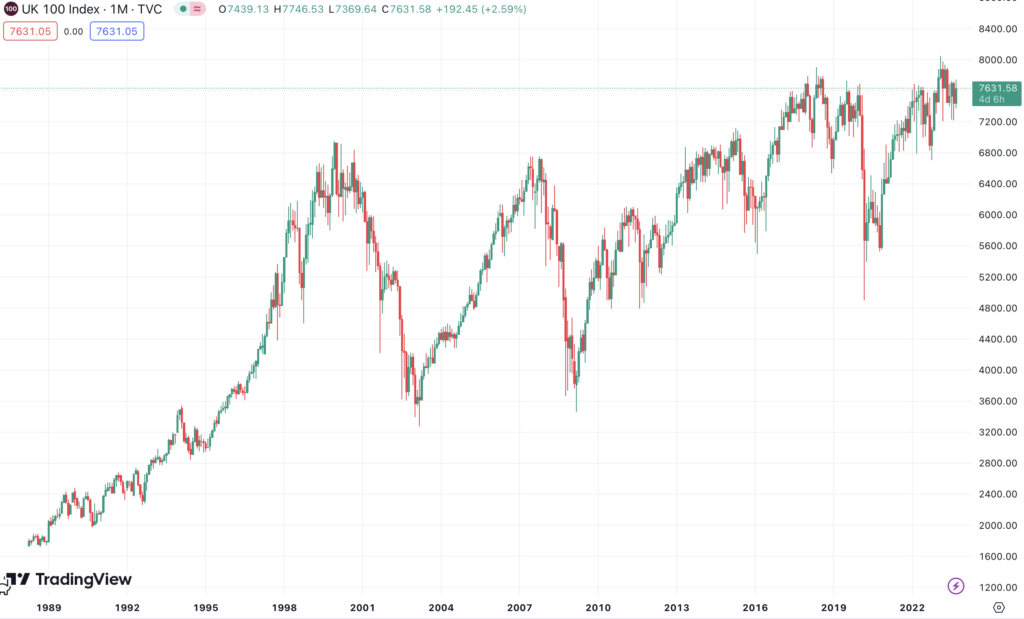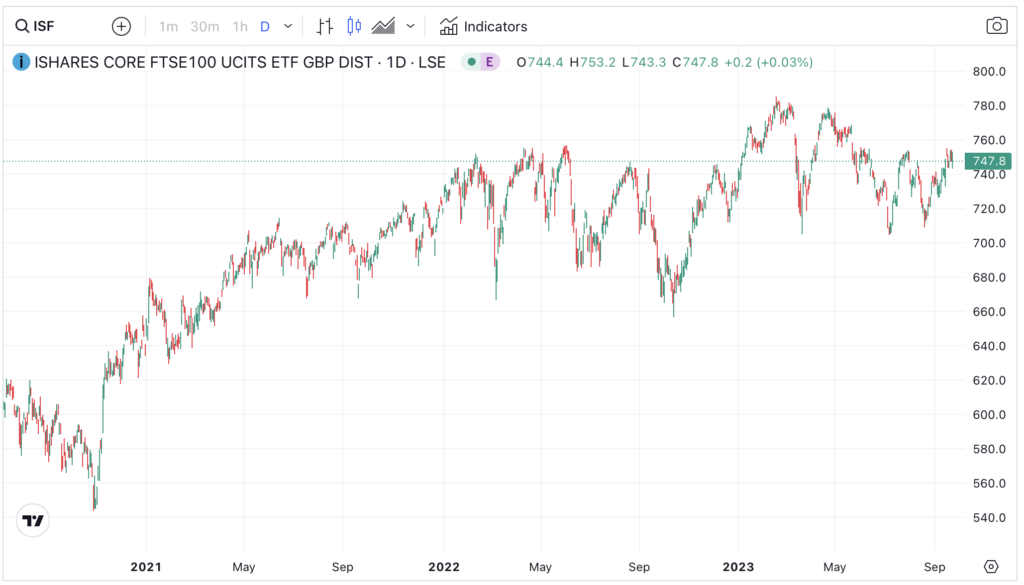The easiest way to invest in the FTSE 100 is to buy an ETF that tracks the index or invest in the FTSE 100 you can either buy an ETF or a derivative contract based on the indices value. In this guide, we will explain what the FTSE 100 index is, and the pros and cons of the different ways to invest in it.
What is the FTSE 100?
FTSE100 (commonly known as ‘Footsie’) is the blue-chip equity index of the UK stock market. As its name implies, the index is comprised of the 100 largest companies (by market capitalisation) listed in the London Stock Exchange.
Tracing its origins to 1984, the Index was devised to rival that of the US S&P 500. In terms of size, the FTSE 100 Index is one of the largest in the world – £1.902 trillion to be exact. Numerous heavyweight companies from major industries are supporting this index (see current constituents here), including:
- Shell (SHEL) – £173 billion
- AstraZeneca (AZN) – £171 billion
- HSBC (HSBA) – £125 billion
- Unilever (ULVR) – £103 billion
- BP (BP) – £90 billion
Weightings of the constituents change every quarter (Mar, June, Sep, Dec – a process known as rebalancing). Larger companies are included; shrinking stocks are removed. In doing so, this ensures the longevity of the index.
The current value of the index is around 7,600. The last two years saw choppy action around 6,800-8,000 (see below).

- Related guide: What is the FTSE All-Share Index?
Advantages of investing in the FTSE 100
The index attracts international institutional investors due to how representative the index is of some industries. In particular, the pros of investing in the FTSE 100 are:
- Size – FTSE 100 is one of the largest and most liquid stock indices in the world
- International – representation of the constituents; many derived their earnings globally
- Maturity – of the UK economy
- Good Dividend Yield – as many stocks operate in industries that are mature
Last I checked, the overall dividend yield on the FTSE 100 index is a good 3.92%. Not bad compared to other equity markets. If you are a novice investor in the UK, the FTSE 100 Index will be one of the first areas to research.
Disadvantages of buying the FTSE 100
However, there are some drawbacks of investing in the FTSE 100 as well. The cons include:
- Lack of technology companies – which is a big turn-off for many growth investors
- Low growth – of the British economy, due to a variety of factors
- Unexciting valuation – of many UK companies
On the third point, look no further than ARM (NASDAQ: ARM). Formerly a heavyweight tech darling in the LSE, it was bought out by SoftBank a few years back. This month, it was relisted. The venue? No other than Nasdaq. The LSE just proved itself unable to hold on to any big tech.
In sum, when investing in the FTSE 100 index you need to be realistic about its future returns. While it may not be the most exciting index, it proves to be a more stable aggregation and, with dividends, are more suited for long-term value investors.
How to invest in the FTSE 100?
Should you decide to invest in this large-cap index, how should you go about doing it?
There are a few ways to gain exposure to this particular sector. Most choose funds that hold these hundred shares in a portfolio.
FTSE 100 ETFs
Major funds that hold UK large-cap shares include:
- iShares FTSE 100 ETF (ticker: ISF, factsheet here)
- Vanguard FTSE 100 (ticker: VUKE, factsheet here)
What differentiates the above two ETFs from the rest is they are the most popular and have the most assets under management. ISF is a £11 billion ETF while VUKE has £4.7 billion AUM. Capital flow to the most liquid instruments.
If you’re a beginner investors, sticking to the largest is often a better strategy. You can buy these low-cost ETF in your ISA account with minimal transaction frictions. Remember, capital gains with ISAs are tax efficient.
Another point worth noting is that ISF is a ‘distributing’ ETF, meaning dividends from the portfolio are passed to shareholders. There is a ‘accumulating’ version whereby dividends are accumulated in the ETFs (iShares FTSE 100 ETF, ticker: CUKX). Its AUM is smaller at £1.8 billion (factsheet).

FTSE 100 Derivatives
If you are more interested in trading the FTSE 100 in the short term, there are other ways to buy the index, although these are more risky because they entails leverage:
- FTSE 100 futures contracts – you are buying a fixed amount of the FTSE index for a set date in the future
- FTSE 100 options contracts – you buy the right (but not the obligation) to buy a set amount of FTSE futures at a set date in the future.
- FTSE 100 spread bets & CFDs – you can speculate on the price of the FTSE 100 index going up or down.
Related guide: What is the FTSE 100 index?

Jackson is a core part of the editorial team at GoodMoneyGuide.com.
With over 15 years industry experience as a financial analyst, he brings a wealth of knowledge and expertise to our content and readers.
Previously Jackson was the director of Stockcube Research as Head of Investors Intelligence. This pivotal role involved providing market timing advice and research to some of the world’s largest institutions and hedge funds.
Jackson brings a huge amount of expertise in areas as diverse as global macroeconomic investment strategy, statistical backtesting, asset allocation, and cross-asset research.
Jackson has a PhD in Finance from Durham University and has authored nearly 200 articles for GoodMoneyGuide.com.


